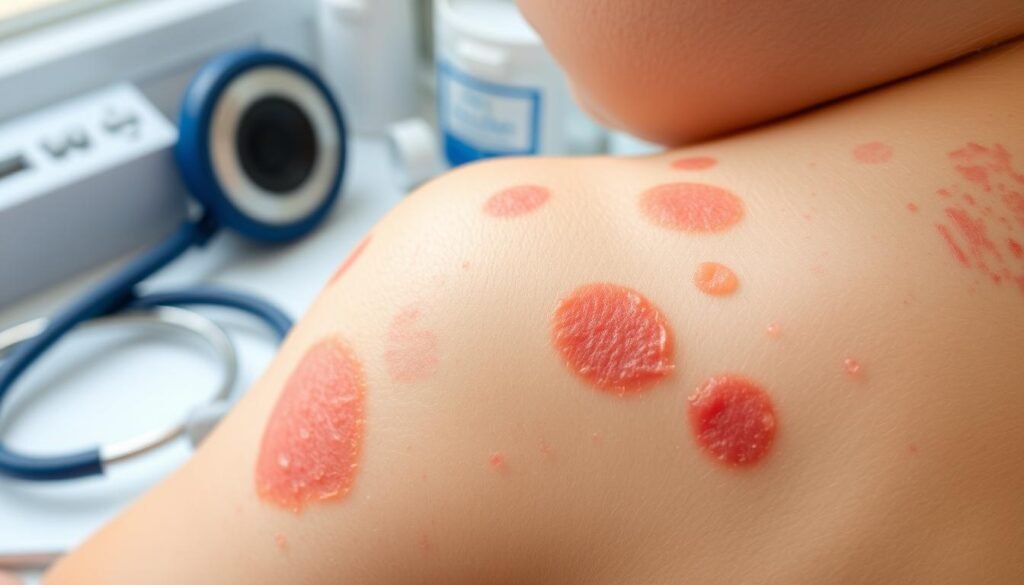Over 31 million Americans are affected by eczema. This condition leads to itchy skin, rashes, and dry patches. Atopic dermatitis is the most common type. It affects over 9.6 million children and 16.5 million adults in the US. Even though eczema is not contagious, it causes a lot of emotional stress. This guide aims to help by explaining symptoms, treatment options, and prevention tips.
Key Takeaways
- Over 31 million Americans contend with eczema in various forms.
- Atopic dermatitis is the most common type, affecting millions of both children and adults.
- Symptoms include dry skin, redness, and episodes of intense itching.
- Effective treatments exist, though there is no definitive cure for eczema.
- Identifying and avoiding triggers is crucial for managing eczema flare-ups.
- Emotional health can be significantly impacted, linking eczema to anxiety and depression.
Understanding Eczema and Its Types
Eczema is a skin condition that causes itching, rashes, and may lead to infections. It affects many people around the world, making daily life hard for them. Learning about eczema, especially atopic dermatitis, is key to managing and treating it well.
What is Eczema?
Eczema makes the skin inflamed, leading to redness, irritation, and a lot of itching. It looks different in each person and has various causes. In people with eczema, the skin barrier doesn’t work well. This causes an immune response that makes the inflammation worse. Eczema can happen at any age, but it usually starts in childhood.
Types of Eczema
There are many kinds of eczema, each with its own features and causes. It’s important to know these differences for the right treatment:
- Atopic Dermatitis: This is the most common type and often starts in kids, continuing into adulthood. Having eczema, allergies, or asthma before increases your risk.
- Contact Dermatitis: This comes from skin contact with irritants like soaps and makeup.
- Dyshidrotic Eczema: It brings small, itchy blisters on your hands and feet.
- Nummular Eczema: This shows up as round patches of irritated skin.
- Seborrheic Dermatitis: It affects oily areas of the body, causing flaky, red patches.
- Stasis Dermatitis: This type mostly affects the lower legs, linked to poor blood flow.
The Role of Atopic Dermatitis
Atopic dermatitis often goes along with other allergies like hay fever and asthma. It mainly begins in babies, affecting up to 15% of them. Starting treatment early can ease symptoms. Genetics play a big part in its development. The skin condition weakens the skin barrier. This makes it easier for irritants and infections to get in. Managing atopic dermatitis is about avoiding things that trigger it. This includes scratchy clothes, dry air, and certain chemicals.
For more in-depth information on eczema and its types, check out this resource.
Identifying Symptoms of Eczema Rash
Understanding eczema’s symptoms can greatly help in managing it. Symptoms include severe itching and changes in how the skin looks. Knowing these signs lets people get the right treatment early, making life better.
Common Symptoms
Atopic dermatitis comes with some usual signs. A big one is itchy skin. Here are things people often see:
- Dry, scaly skin areas
- Red rashes, more visible on lighter skin
- Small, rough bumps on darker skin
- Flare-ups that change in intensity
These symptoms can cause other problems like skin infections. Staph infections and eczema herpeticum are examples. Knowing these signs early helps control eczema better.
Symptoms in Different Age Groups
Eczema looks different at various ages. Babies usually have rashes on the face and scalp. Kids tend to get them here:
- Elbows
- Knees
- Ankles
Adults mostly get symptoms on hands and feet. The look of the skin and how severe symptoms are can vary with age and race. This shows how complex eczema treatment is. For more info, look at this resource.
Skin Appearance Variations
Skin changes a lot with eczema. People with this condition may have:
- Raised spots that show inflammation
- Sores or areas that ooze because of scratching
- Swelling during flare-ups
How the skin looks varies with skin color and where on the body it is. Knowing these differences helps in choosing the best treatment for each person.
What Causes Eczema Rash?
Eczema comes from complex causes. It’s not about just one thing. Genetic factors and environmental triggers play big roles. Knowing about these helps in treating and managing eczema.
Genetic Factors
Genes are key in deciding if you might get eczema. If your family has a history of eczema, asthma, or allergies, you’re more likely to get it. It’s about how your immune system reacts.
Adults have a 2-3% chance of getting atopic dermatitis (AD), but kids? About 1 in 4 may get it before turning five. African American and Hispanic kids often have it tougher with eczema.
Environmental Triggers
Environmental triggers can make eczema worse. Things like strong soaps, the weather, and pollen are common culprits. Also, skincare products and allergens around you can cause more issues. This shows how our genes and surroundings work together to trigger eczema.
Immune Response to Irritants
Our immune system’s reaction is key. Facing irritants, it might go into overdrive. This makes inflammation worse, leading to symptoms like redness and itching.
Dealing with eczema means knowing these immune responses. Treatments could be creams or medicines like dupilumab (Dupixent) and tralokinumab-ldrm (Adbry).
Eczema Rash: Diagnosis and When to See a Doctor
Knowing how to diagnose eczema is key to managing it well. If you think you might have eczema, start by seeing a doctor. They’ll look at your symptoms and your health history. This helps them find out if other things might be causing your skin issues.
Consultation Process
At your first doctor’s visit, they’ll check your skin closely. They want to see where and how bad your eczema is. If they need more information, they might order tests. One common test is patch testing to see if allergies are causing your eczema. This test can take several appointments over a week to get clear results.
Potential Allergy Testing
Allergy tests are also key to figuring out your eczema triggers. If these tests find something, your doctor will help you avoid these triggers. Sometimes, if the situation is still not clear, doctors do a skin biopsy. This means taking a small skin sample to look at in a lab. Results are usually ready in three to seven days. Knowing exactly what’s going on can really improve life for someone with eczema. For more info on eczema and treatments, you can check this resource.

Effective Treatment Options for Eczema Rash
Finding the right eczema treatment is personal. It depends on your own symptoms and how severe they are. Many treatments are available. It’s key to talk with a doctor to find the best path for you. Here are some common methods to control eczema.
Topical Treatments
Topical solutions are the first step in fighting eczema. These treatments include:
- Topical corticosteroids: These creams come in different strengths. They vary from mild over-the-counter products to stronger prescription creams for tougher cases.
- Calcineurin inhibitors: These are prescription creams that tackle inflammation without steroid side effects.
- Barrier repair moisturizers: These products help keep moisture in the skin. They fix the skin’s natural barrier to lessen dryness and irritation.
Oral Medications
Some people with severe or widespread eczema might need oral medications. Common types include:
- Antihistamines: They’re great for easing itchiness and swelling. They work well if allergies trigger your eczema.
- Systemic corticosteroids: These are powerful drugs for quick relief during bad flare-ups. However, they’re not for ongoing use.
Advanced Treatment Modalities
When standard treatments don’t cut it, your doctor might suggest more advanced options:
- Biologics: These are for when nothing else has worked. They target the immune system.
- Phototherapy: This is a light therapy that helps with inflammation and itchiness. It’s good for moderate to severe cases.
Creating a treatment plan personalized to your needs can really improve your life. For tips on spotting eczema and managing it, check out this resource.
Eczema Management Strategies
To manage eczema well, you need a daily routine for skin care. Keeping up with this routine helps keep skin healthy. It reduces the chances of severe eczema attacks. Using moisturizers is key, as they keep your skin moist and protect it.
Daily Skin Care Routine
A daily routine for skin care is a must for eczema patients. Use moisturizers without fragrance twice a day to see better results. You should follow these steps:
- Bathe in warm water, not hot, to avoid drying out skin.
- Choose mild, gentle soaps that don’t have perfumes or dyes.
- Moisturize right after showering to seal in moisture.
- Don’t rub your skin dry. Instead, pat it gently with a soft towel.
- Have a night-time skin care routine to keep skin moisturized overnight.
Importance of Moisturizers
Moisturizers are very important in controlling eczema. They keep the skin from getting dry which prevents irritation. Pick moisturizers that are safe for sensitive skin — non-comedogenic and hypoallergenic. Moisturizers have many benefits, such as:
| Benefit | Description |
|---|---|
| Hydration | Moisturizers keep skin hydrated, reducing the risk of flare-ups. |
| Barrier Protection | They strengthen the skin barrier against irritants and allergens. |
| Itch Relief | Well-hydrated skin is less itchy and irritated, improving comfort. |
| Soothing Effect | Many moisturizers contain ingredients that soothe inflamed skin. |
To learn more about controlling eczema and caring for your skin, visit this site for more information.

Identifying and Avoiding Eczema Triggers
Finding out what causes your eczema to flare up is key to controlling it better. Knowing the triggers lets you stay away from things that make your symptoms worse. Common triggers include allergens and environmental factors that may make your skin react.
Common Allergens
Some allergens tend to make eczema worse for a lot of people. Here are some common ones to watch out for:
- Dust mites
- Pet dander
- Certain foods, like dairy and nuts
- Soaps and shampoos
- Fragrances and preservatives in personal care items
- Plant ingredients such as aloe and coconut oil
Since these allergens are often in daily products, it’s important to check labels closely. Keeping a diary of eczema triggers can also help figure out what to avoid.
Environmental Factors
Where you live can affect your eczema too. People in very hot, cold, or humid places may see more skin issues. Among other things that might make eczema worse are:
- Dry air making skin dry
- Changing temperatures
- Contact with airborne allergens
- Getting sick with the flu or other viruses
- Stress making your body react with inflammation
To manage eczema well, be aware of environmental triggers and allergens. By actively avoiding these factors, keeping eczema under control becomes easier.
Preventing Eczema Flare-Ups
Stopping eczema flare-ups needs a mix of lifestyle changes and stress control. People have different triggers, so it’s vital to watch your own closely. Making smart choices helps keep outbreaks low and skin healthy.
Lifestyle Adjustments
Lifestyle changes are key in stopping eczema flare-ups. It’s crucial to keep skin moist; using a thick, scent-free moisturizer after showers helps. Also, avoiding harsh soaps, shampoos, and products is beneficial. Choose soft clothes to reduce skin irritation.
- Avoid extremely hot showers and opt for lukewarm water.
- Consider using a humidifier to maintain moisture levels in the air, especially during dry seasons.
- Maintain a clean living environment to reduce dust and allergens.
- Keep a diary to monitor triggers and symptoms for better management.
Stress Management Techniques
Managing stress well is crucial for your overall health and helps prevent eczema flare-ups. Using meditation, yoga, and exercise improves how you handle emotions. Enough sleep keeps your skin and mood balanced. It’s important to find calming activities that work for you since this influences skin reactions to stress.
- Incorporate daily breathing exercises.
- Engage in activities that promote relaxation and joy.
- Stay connected with supportive friends and family.

| Adjustment/Techniques | Benefits |
|---|---|
| Moisturizing regularly | Prevents dryness and irritation |
| Using gentle fabrics | Minimizes skin irritation |
| Practicing mindfulness | Reduces stress which may trigger flare-ups |
| Keeping a clean environment | Reduces exposure to allergens and irritants |
By using these strategies, you can actively prevent eczema flare-ups and keep your skin healthy. Looking at lifestyle and stress management options gives you more control over your skin’s health.
Understanding the Emotional Impact of Eczema
Eczema is not just skin deep; it can really affect how people feel inside. Studies link eczema to mental health problems, like anxiety and depression. If you have eczema, you might feel more down or worried than others. This shows why treating eczema should also include care for your mental health.
Link Between Eczema and Mental Health
Atopic dermatitis, a common type of eczema, might make you more prone to mental health issues. The worse the eczema, the more stress and sadness someone might feel. For instance, the risk of feeling depressed is higher if your eczema is severe. Understanding this link urges the need for treatment plans that focus on both skin and mental health.
Coping Mechanisms for Affected Individuals
There are ways to lessen the emotional toll of eczema. Here are some helpful strategies:
- Therapy or counseling can help with stress from personal problems.
- Support groups offer a space where everyone gets what you’re going through.
- Relaxation techniques like yoga or meditation can calm stress.
- Regular exercise helps release tension, just watch for triggers.
- Engaging in enjoyable activities shifts focus from stress to well-being.
Pushing for better mental health while dealing with eczema strives for a balanced life. It might help to look into emotional wellness guidelines. Taking care of your sleep, stress, and emotions makes you stronger against eczema’s effects.
Conclusion
Eczema rash is a complex challenge. It requires a unique approach for treatment and care. Understanding its causes, symptoms, and treatments is key for effective management.
Research shows that eczema affects many people. About 15% to 30% of kids and 2% to 10% of adults suffer from it. This highlights the need for extensive care and knowledge.
Being proactive about skin health helps improve life quality. This means knowing and avoiding what causes flare-ups. It also involves using the right treatments, like anti-inflammatory creams, and keeping skin moist.
It’s also critical to understand the role of environmental allergens and genetics in eczema. This knowledge helps in making a custom plan to manage it.
In summary, though eczema is widespread and complex, knowing more about it gives people control. With the right management strategies, they can ease their symptoms. And they can work on better skin health in the long run.